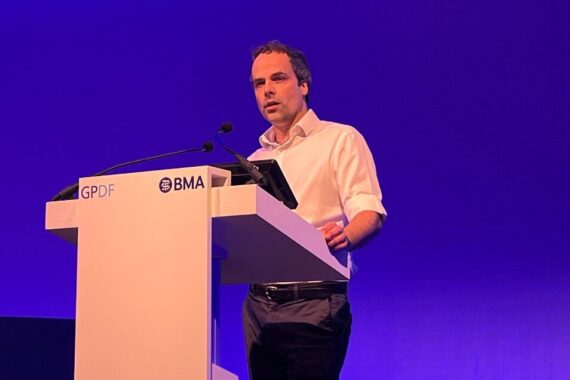LMCs call for ‘appropriate controls’ on AI in general practice

GP leaders have voiced their concerns regarding the developing use of artificial intelligence (AI) in general practice at today’s UK LMC conference.
LMCs voted in favour of a motion that said ‘only a doctor with full training and appropriate levels of experience will be able to effective challenge an AI when it produces questionable results’.
And although they believe AI ‘has the potential to improve consistency and safety of doctor led care’ this is only true ‘when doctors are enabled and indemnified to challenge it’.
They also think the use of AI ‘will not remove the need for doctor oversight of patient care’.
The motion also called on the national GPCs to ‘make it clear that primary care without GPs, especially in a world of data hungry AI, will lead to an unsustainable increase in cost and ultimately a two tier NHS’.
Proposing the motion, Dr Jethro Hubbard (pictured), from Gloucestershire LMC, said: ‘There are competing visions for how AI will transform general practice. Proponents of the doctor-light model would have us believe that AI and allied health professionals can replace the GP in all but the most complex of cases.
‘For me, this is a dystopian future. It ignores the human factors that make the doctor patient relationships so important, And ironically, it is likely to cost more in the longer term.
‘AI is data hungry. algorithms are risk averse and can be biased toward system benefits. We’ve all experienced the 111 algorithm firsthand that is just the start.’
Dr James Murphy from Buckinghamshire said: ‘We cannot afford to place a blind trust in our Government to consider the adverse consequences of AI with sufficient prioritisation of risk control. Our lived experience of poor quality and safety assurance must inform how we hold the Government to account as AI systems are rolled out and we need to be ahead of the game.’
Speaking against the motion, Dr Anthony O’Brien from Devon LMC, said: ‘Our PCN is currently involved in a trial of AI in the South West. Its trying to look at preventing patients to get into hospital. It’s a system that probably will be useful in the future, but it’s going to roll out and probably do something completely different. It needs to be properly evaluated first. We want to avoid things being brought out before they’re evaluated.’
Dr Katie Bramall-Stainer, chair of GPC England, said: ‘AI is a tool, it’s a cog in a machine. It’s not a process in and of itself, no matter how much a secretary of state wants it to be. Humans aren’t logical. And as GPs we take the history because we have to tease out the facts.’
The Government has hailed the potential of AI in boosting NHS efficiency, most recently saying that GPs will be ‘supported’ with new technologies such as AI to reduce antibiotic prescribing and tackle antimicrobial resistance.
But digital experts have warned that GPs using AI need to be aware of liability risks and maintain their ability to ‘critically appraise’ the technology.
Speaking at the Pulse Live conference earlier this year, Dr Annabelle Painter, an honorary digital health fellow at Imperial College and GP registrar, said GPs could be ‘the ones that hold the can’ when AI gets decisions wrong.
Motion in full
That conference recognises that artificial intelligence (AI) is likely to impact the provision of care significantly over the next decade and calls for appropriate controls to ensure the safe introduction of systems in primary care, in particular that:
(i) only a doctor with full training and appropriate levels of experience will be able to effective challenge an AI when it produces questionable results CARRIED AS A REFERENCE
(ii) AI has the potential to improve consistency and safety of doctor led care, but only when doctors are enabled and indemnified to challenge it CARRIED
(iii) while AHPs are likely to see similar gains in productivity, consistency and safety the use of AI will not remove the need for doctor oversight of patient care CARRIED
(iv) that any introduction of AI should take lessons from sectors such as aviation and ensure that doctors are not so far removed from routine cases that they become de-skilled CARRIED
(v) that GPCs should make it clear that primary care without GPs, especially in a world of data hungry AI, will lead to an unsustainable increase in cost and ultimately a two tier NHS. CARRIED









